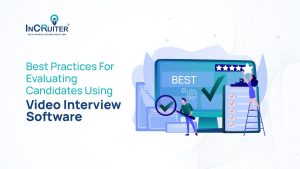
In most organizations, recruiters need to experiment with different interview formats in order to find which format works best for them. Whether you’ve adopted Zoom or similar tools for candidate screenings or transitioned to a fully remote onboarding process, technology has likely transformed your hiring methods.
Amidst all this, deciding which interview format to choose can be a tough task. Well, don’t worry. In this blog, we will discuss how you can choose the most suitable interview format for your business.
Understanding Different Interview Formats

Before deciding on one, it is essential to understand the different types of interview formats. We will delve into the three major formats:
Traditional In-Person Interviews
In-person interviews have traditionally been the cornerstone of the hiring process, providing direct, face-to-face communication. In this format, the candidate and interviewer communicate face-to-face, gaining real-time feedback and a deeper understanding of each other. Despite these advantages, in-person interviews can be both time-consuming and logistically demanding, often requiring significant coordination and scheduling efforts. Additionally, they may not always be feasible for remote candidates or during times of travel restrictions, further complicating the hiring process.
Phone Interviews
Phone or on-call interviews are often used as an initial screening tool. They are cost-effective and convenient but lack the visual cues that can be critical in assessing a candidate’s nonverbal communication skills. This format is usually the first choice for recruiters to screen candidates, ask about their experience, and see if they match the basic requirements. Despite a few drawbacks, phone interviews remain a valuable first step in the hiring process, helping to identify suitable candidates for more in-depth evaluations quickly.
Video Interviews
Video interviewing is a great and effective way to conduct interviews. Using video interview software offers a convenient and remote communication platform that allows both parties to conduct interviews conveniently. This format also provides flexibility, enabling interviews to be conducted across different time zones and locations, thus broadening the talent pool. However, the heavy reliance on technology means that connectivity issues, software glitches, or hardware malfunctions can disrupt the process. To avoid this, using a platform like InCruiter’s IncVid can offer convenience and results.
Also Read: Video Interviewing: Cost-Effective Hiring Solutions for Startups
How to Decide the Best Interview Format for Your Hiring Needs?
Assessing Your Hiring Needs
Choosing the best interview format depends on your specific hiring needs. Factors like the nature of the job, required skills, the volume of applicants, and the urgency to fill the position are all factors that need to be considered. If you are hiring for a technical role then using a video interview tool that offers coding assessments and live code compiler is a good option.
Initial phone or video screenings can help narrow down the pool efficiently before moving to more in-depth interview formats for situations like a high volume of applications.
Leveraging Technology
Technology plays a pivotal role in modern interviewing. Opt for an interview format that can help you leverage technology and fast-track the interviewing process. Invest in reliable video interviewing platforms to facilitate smooth and professional remote interviews. Incorporate assessment software to evaluate technical skills or cognitive abilities. These tools can provide objective data to support your hiring decisions.
Combining Multiple Formats
Opting for a hybrid approach can help make the hiring process more effective. Combining multiple interview formats has proven to be most effective when it comes to faster recruitment. For example, you might start with a phone screening, followed by a video interview, and conclude with an in-person or panel interview. This approach allows you to gather comprehensive insights about the candidate based on different criteria.
Also Read: Ever-growing demand for interview-as-a-service market post pandemic
Conclusion
For different hiring needs, hiring managers can choose suitable interview formats. By understanding the various formats, assessing your hiring needs, leveraging technology, and considering a hybrid approach, you can select the format that best aligns with your goals and company culture. This will help you streamline your hiring requirements to attract and retain top talent.
Frequently Asked Questions
Ans: In a hybrid interview format, recruiters can use a mix of phone interviews, video interviews, and in-person interviews for better and more effective candidate evaluation.
Ans: Using video interview software like InCruiter’s IncVid is the best tool for video interviews in the current market.
Ans: Some of the common interview formats are phone interviews, video interviews, in-person or panel interviews, etc.
Ready to Transform Your Hiring Process?
Discover how our AI-powered interview platform can streamline your recruitment and find the best candidates faster.






